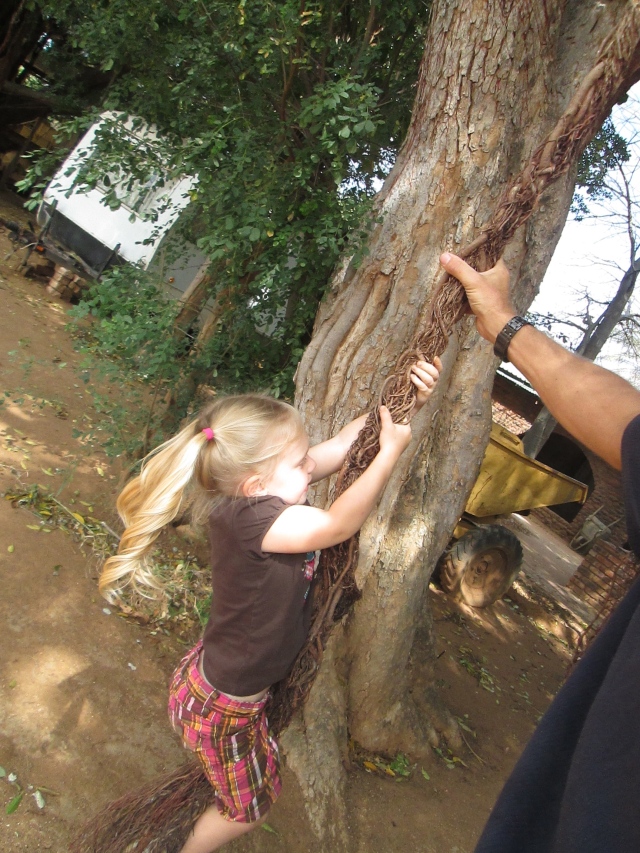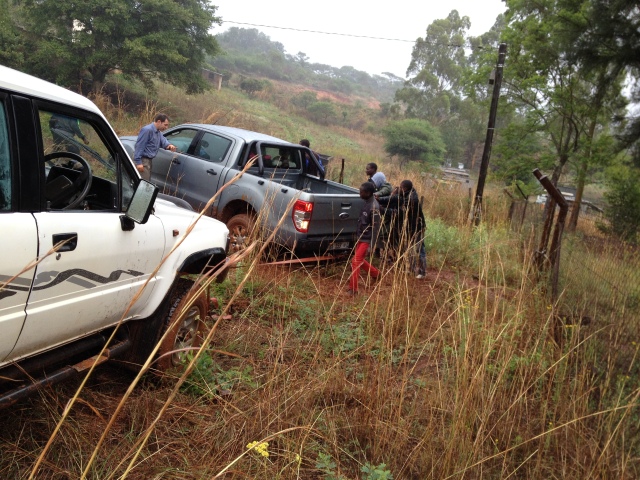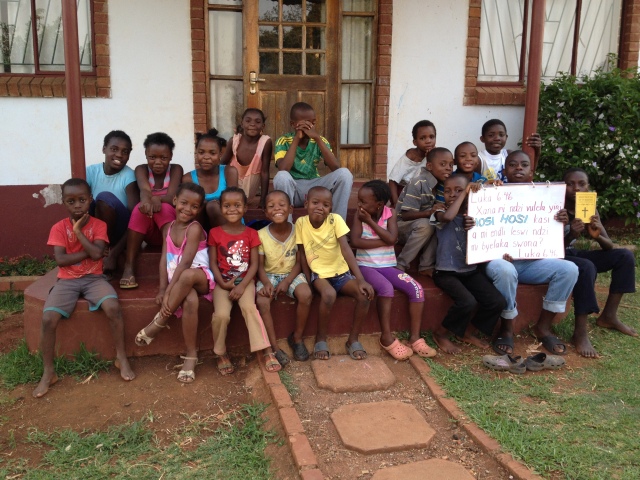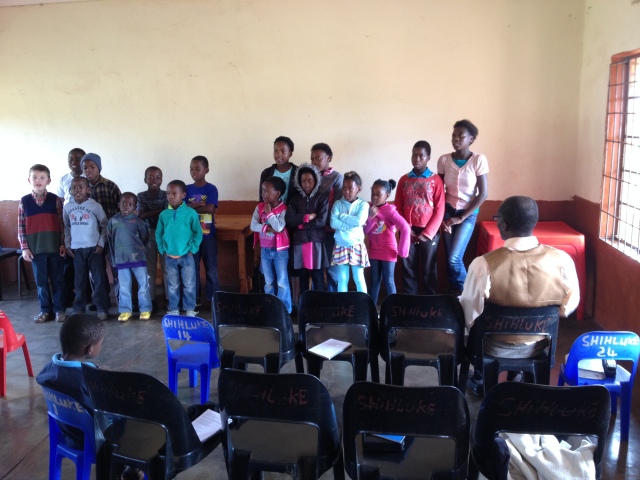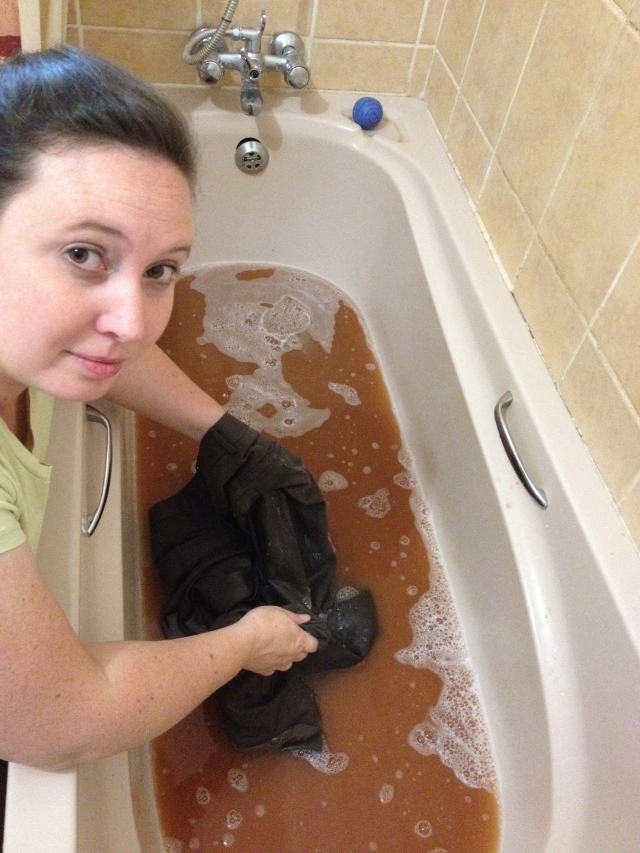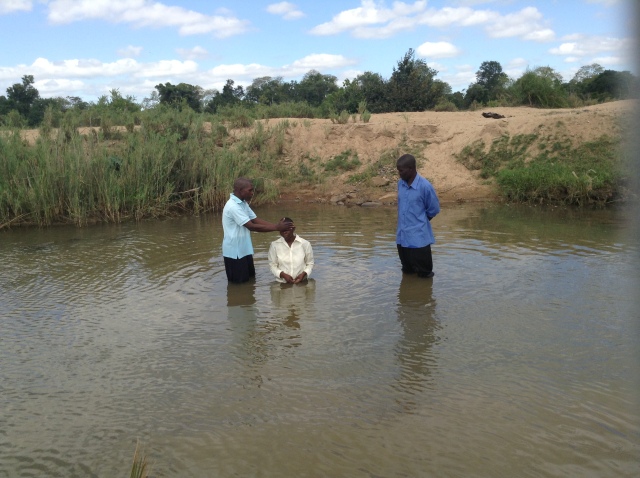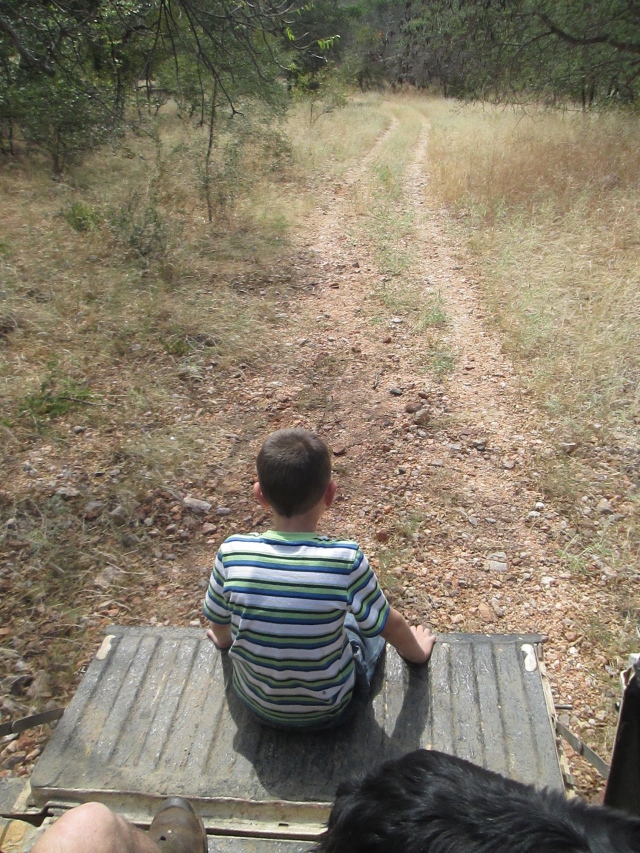"Don't let your kids walk alone down to the river behind the house.
There might be crocodiles." I laughed inwardly at how strange it was to
hear such a statement. It reminded me of South Africa's incredible
diversity. Cities host huge malls selling iPads and iPhones, but rural
areas host rivers with crocodiles.
Boer
is Afrikaans for "farmer." Many of the Dutch settlers in South Africa
were farmers, and many Boers still farm around the country. With some,
it's more of a hobby than their main occupation, as in the case of our
friends, whose farm we recently visited for a day.
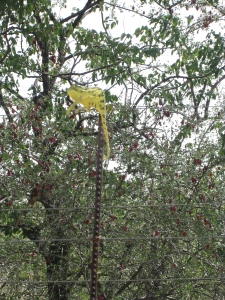 |
| A chameleon! |
Another
difference between Boer and American farms is that the Afrikaners just
say "farm" to mean either a "game farm" or an agricultural farm. When I
picture a farm, I picture cultivated fields growing green stuff, with a
barn and some cows, etc. But many farms here look like completely
untouched land. That's because they are game farms, or perhaps what we
would call a ranch. Our friends had a game farm.
I thought their
farm was near to Louis Trichardt, the closest town to our village (a
half hour away). Actually their farm bordered Zimbabwe! We drove to
Musina, the border town, and then drove east for another hour, an almost
3-hour drive in total.
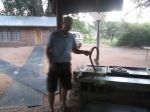 |
| Grilling wors in the outdoors. |
After
a dinner of "boerewors" (farmer's sausage), salad, and "crisps"
(chips), the two older boys got to go on a "night drive" with their dad
and the farmer, while I stayed back with the littles. Afrikaners make
amazing salads. You might think a salad usually has a lettuce base; but a
salad here can mean any vegetable combination with some sort of
dressing (and that's usually straight flavored vinegar, not some fancy
concoction). In the past I would have turned my nose up at a salad with
cooked peas, corn, and tiny tomatoes in a grape vinegar dressing; but I
have learned that Afrikaners have a magic touch when it comes to salads.
No matter how unthinkable the combination might be to you, just trust
that it'll be good.
I later read the label on the vinegar bottle.
It read, "Great for salads, pickling, and marinades." Unfortunately, it
performed the middle description on my stomach. My stomach felt pickled
all night. I finally drifted off to sleep in an air-conditioned room.
(Back home "across the mountain," I'd been cuddling up under thick
blankets to stave off the approaching winter cold.) Here near the border
it was noticeably warmer.
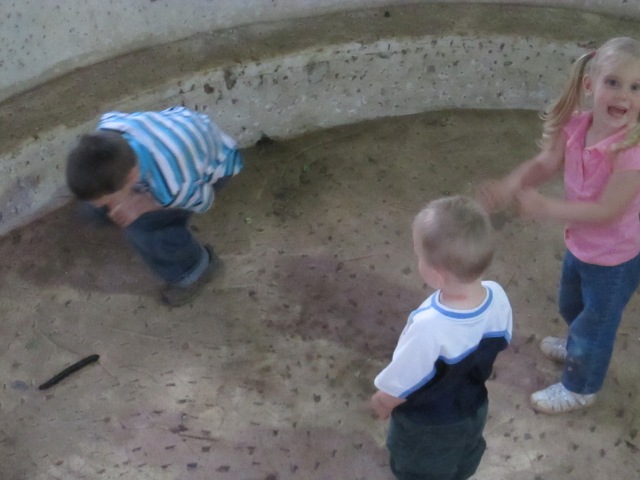 |
| The biggest millipede I've ever seen. |
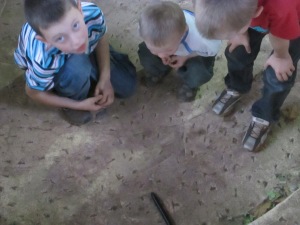
The
following morning we ate a stout, homemade Boer breakfast and took a
drive around the farm with our hosts. Their farm borders two major
rivers in our province, the Nzhelele (which they confidently
mispronounced with no pretensions at trying to pronounce it the African
way--another humorous mark of the stereotypical Afrikaner--not so PC)
and the Limpopo River, which our province is named for, and which
delineates the border between South Africa and Zimbabwe and between
South Africa and Mozambique.
"We're going to the dam first," they informed us. I'm picturing a governmentally-built affair and was shocked to hear that
they built it!
We affectionately coined an acronym for this Boer spirit--ACF:
Afrikaner Confidence Factor. They have such a can-do "Make-a-Plan" (a
common phrase) spirit that they will often give you tidbits of dogmatic
advice or information that leave your head whirling with incredulity.
So we put our own protective filter on their unscreened confidence--the ACF. If they had told
me on my hypothetical farm to just
build my own dam,
I would have laughed it off as extraordinary overconfidence. Yeah,
right! Like you could build your own dam. But I saw it with my own eyes.
And my son fell in it with his own feet. *glare* We were amazed and
pleased to know such resourceful, able people. And if you express
amazement, they will act like it's nothing. "It took about 1,000 bags of
cement," they inform us.
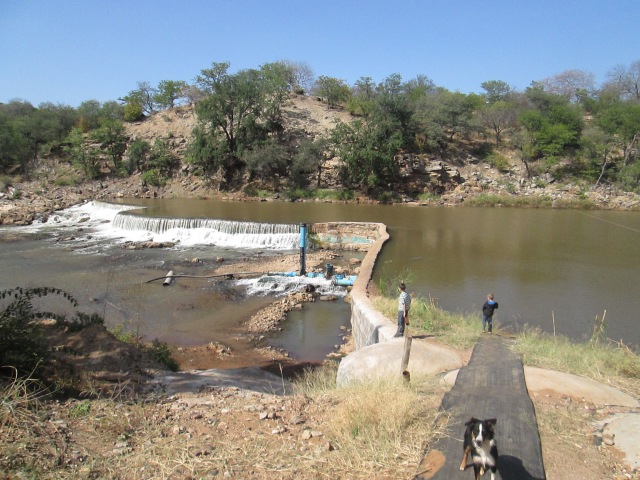 |
| The
homemade dam. Colin is already wearing his jacket after his
trip-and-drip. He didn't fall off the dam wall, but down by the pipes. |
We
also visited the little "houseboat" they built themselves. They are
used to swimming in that river. Although crocs can be a danger, they
weren't plentiful in the Nzhelele; until some months ago a crocodile
farm upstream flooded due to lots of rain this year. About 5,000 crocs
just swam right out of their farm and now inhabit the rivers. The farm
only recovered some hundreds of them.
Our friend took his rifle
everywhere with him. He hoped to shoot a buck for meat to sell (they
tell me they don't shoot the females here), as well as a large crocodile
the workers had sighted several times sunning itself in front of a
water pump. We didn't see any crocs, but I had trouble sleeping Tuesday
night because of my imagination running away with me. Most of you know
we have our own crocodile history with our teammate being attacked
several years ago.
The homemade dam allows more water for their
game; they had several varieties of deer--impala, nyala, kudu,
eland--and giraffe. When the giraffe gets old (about 15 years old), it
loses its teeth. When all the teeth are gone, it starves to death. So
before that happens, the Boers, for about $1,500, give the pleasure of
shooting game and having a stuffed giraffe's head on his study wall to a
foreign hunter. This is the kind of elite hunting common in Europe.
Americans should be thankful for their sportsmen culture and freedom to
hunt, as we discovered recently when watching
this documentary (free online for a limited time).
As
we drove around the farm, I asked the Mrs. why her husband had
mentioned the night before needing to make their presence known on the
farm. She told me of two more real dangers than crocs that they
regularly face.
- Poachers: the farm has many
acres and little surveillance. When they tried to set up a camera to see
what was happening, it was stolen. Poachers come in and kill the deer.
Sometimes they find the animals tied with a wire around its neck to a
tree, choked to death. Sometimes there is no sign. Animals are simply
missing, decreasing in number.
- Smugglers:
"Drugs?" I asked. Yes, drugs, but it's usually cigarettes, which are
highly taxed here. If they can smuggle them across the border, the taxes
are avoided; and they can get way more profit. Once they saw four
vehicles full of men cutting across their property which they knew were
either the poachers or smugglers, but they were only two people with one
rifle between them, and so didn't attempt to stop them.
I
knew how many Zimbabweans had fled into South Africa in the past decade
because of their dictatorial, mad president who impoverished Zimbabwe,
making it the third poorest country in the world at the time, and how
many were in our village a few hours away. I wondered if they had seen
several crossing through their land. They confirmed that there were
many. Even their current workers sneaked across the border a few years
ago, fording the crocodile-infested rivers with their few belongings on
their heads and coming through the easily accessed fences on their farm.
"Wasn't
there a border patrol?" I wondered. They chuckled. No. There were
occasional police watching the borders; but they can't be everywhere,
and worse than that, they are so corrupt that they let anyone go with a
bribe. The border patrol is no help to the Boers with Zimbabweans
crossing the farm illegally, whether poachers, smugglers, or refugees.
This
we did next ourselves! We had traversed the farm, noticing game (our
friend tried to hunt a few, but didn't get any good shots), huge yellow
and black spiders hanging in webs across the dirt-track road, and losing
my son's shirt which Seth had placed on top of the truck to dry from
his earlier accidental dip in the dam, finally arriving at the Limpopo
River which forms the other border to their farm. We turned onto a track
that followed the border fence.
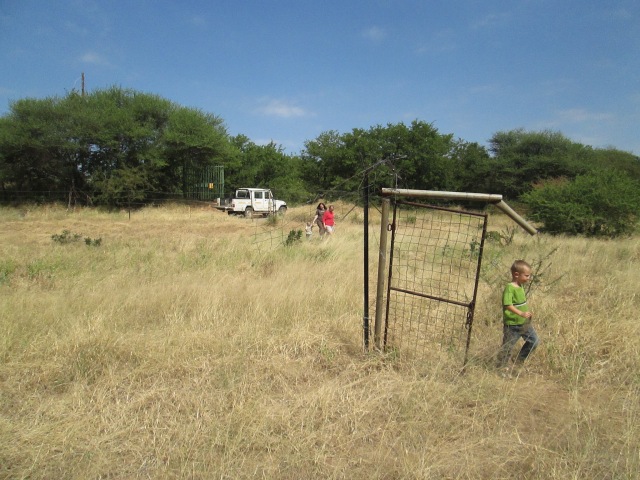 |
| Border-hopping. |
There
was a small strip of "no-man's land" between South Africa's mesh wire
fence and Zimbabwe's. The Limpopo was just beyond the Zimbabwean fence.
At first the border fence was a decent fence with barbed wire on top;
but it quickly deteriorated as we drove, until we came to a place with
no fence at all. Two gates, one in each country's fence, were both open
with no pretense at all at keeping anything from passing between one and
the other. This is where many people border-hop without needing the
proper papers. We ourselves walked right through and visited the Limpopo
River.
It was deserted, but our friend told us that on the
weekends it is full of people fishing and...border-hopping. It was
beautiful and a little bit thrilling to be able to visit such a historic
landmark without needing to go through the happiness-destroying process
of having passports stamped. We skipped rocks for a bit, snapped a
picture, and headed back to the farm.
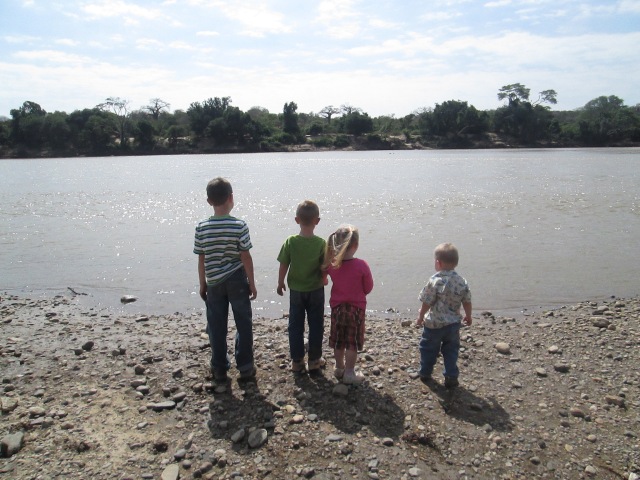 |
| Limpopo River |
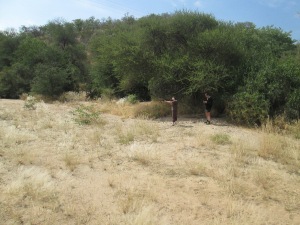 |
| Don't mess with Mom! |
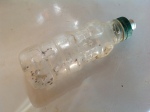 |
| The evidence! |
On
the way back to the farmhouse, Seth got the chance to shoot the rifle
at an empty water bottle. He hit it several times. They asked if I
wanted a turn. I'd only ever shot at a Christian camp once or twice. The
rifle had scopes on the top, but it was a heavy piece of work. I
accidentally touched the tip, still hot from Seth's firing. They threw
another water bottle closer than Seth's had been. It took me a bit to
focus through the scopes, but the scopes and cross-hairs made it easy to
sight the target. I shot twice and made two holes in my bottle! They
said I could be a sniper, but I demurred that if the target were moving,
that would make a difference. :)
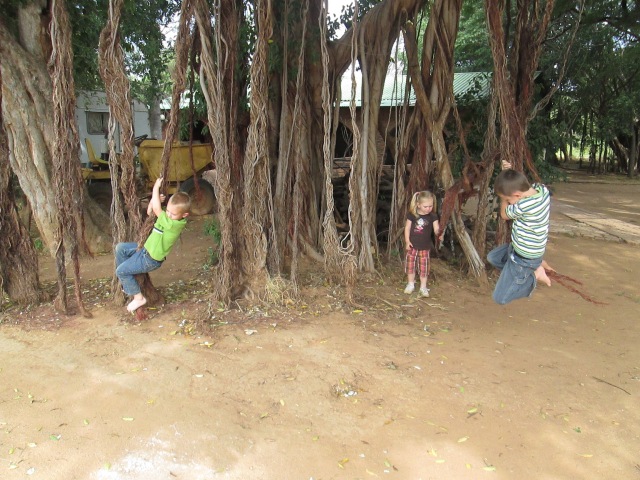 |
| Swinging on vines. |
There
are several disadvantages to being a missionary kid, Seth and I
discussed on the way home, but there are certain pleasing advantages as
well. I was glad for the children to see normal use of a firearm, the
great rivers of our area, wild game, and gain a broader international
knowledge of how our world works today, with some of the interesting
challenges to running a farm on the border of South Africa and Zimbabwe.
